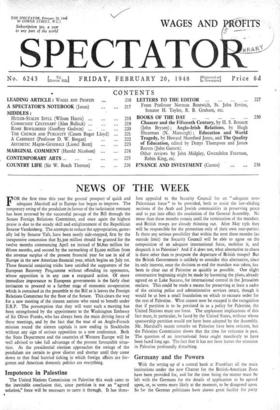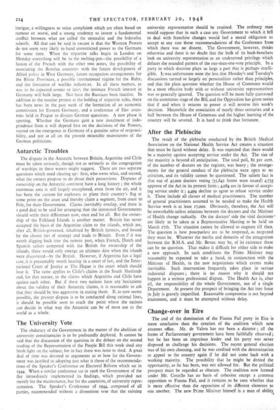Germany and the Powers
With the setting up of a central bank at Frankfurt all the main institutions under the new Charter for the British-American Zone have been provided for, and for the time being the matter must be left with the Germans for the details of application to be agreed upon, or, as seems more likely at the moment, to be disagreed upon. So far the German politicians have shown great facility for party
intrigue, a willingness to voice complaind which are often based on rumour or worse; and a strong tendency to invent a fundamental conflict between what are called the centralist and the federalist schools. All that can be said in excuse is that the Western Powers do not seem very likely to hand unrestricted power to the Germans for some time. When the tripartite talks begin in London on Monday everything will be in the melting-pot—the possibility of a fusion of the French with the other two zones, the possibility of associating the Benelux countries with the future development of Allied policy in West Germany, future occupation arrangements for the Rhine Provinces, a possible international regime for the Ruhr, and the limitation of warlike industries. In all these matters, as was to be expected sooner or later, the intimate French interest in Germany will bulk large. Nor have the Russians been inactive. In addition to the routine protest at the holding of tripartite talks, there has been news in the past week of the formation of an economic commission for Eastern Germany, and a conference of Slav coun- tries held in Prague to discuss German questions. A new phase is opening. Whether the Germans gain a new instalment of inde- pendence from it will depend first on the decisions of the Powers, second on the emergence in Germany of a genuine sense of responsi- bility, and not at all on the present miserable manoeuvres of the German politicians.































 Previous page
Previous page